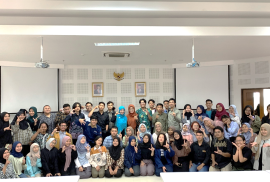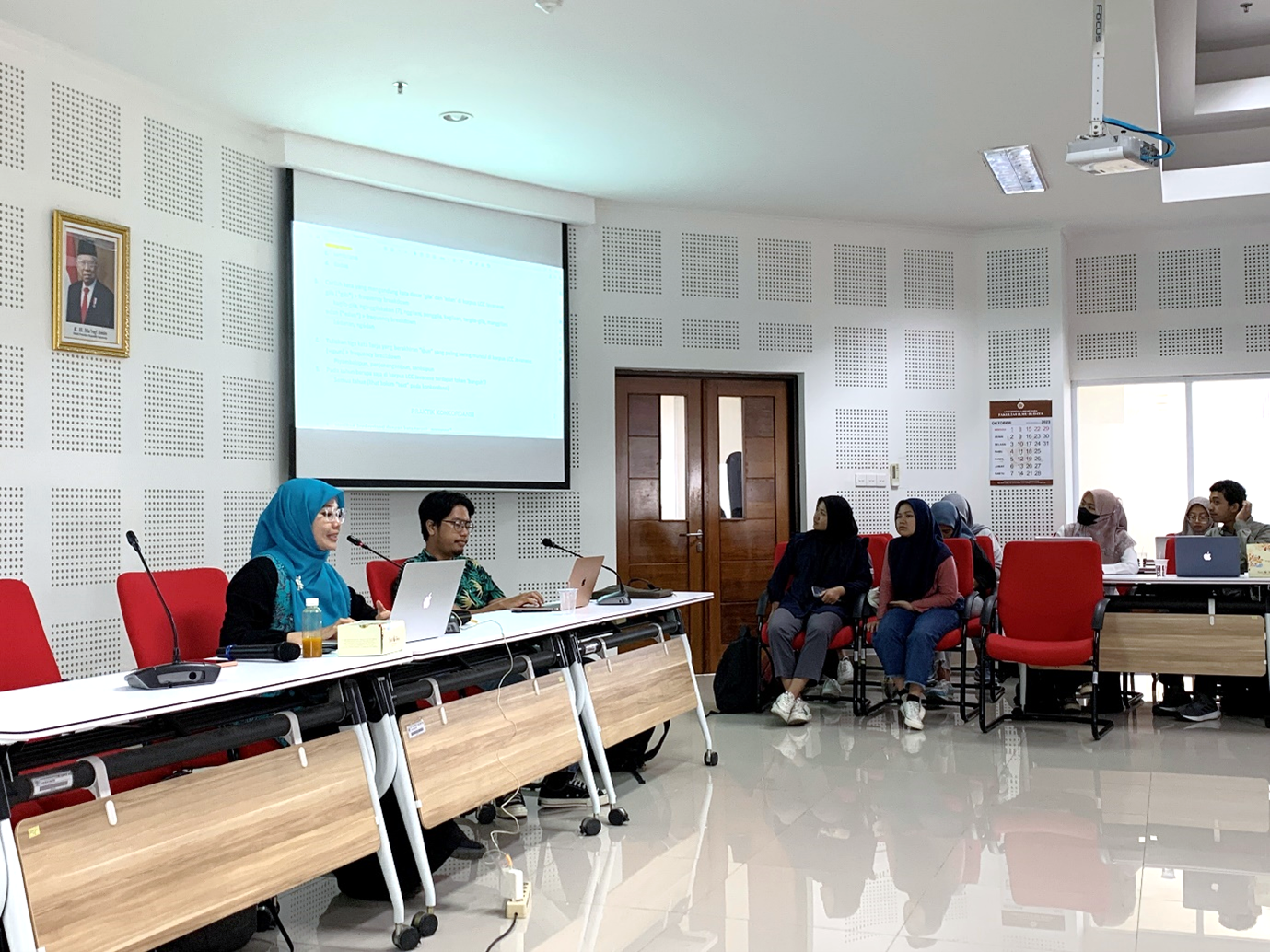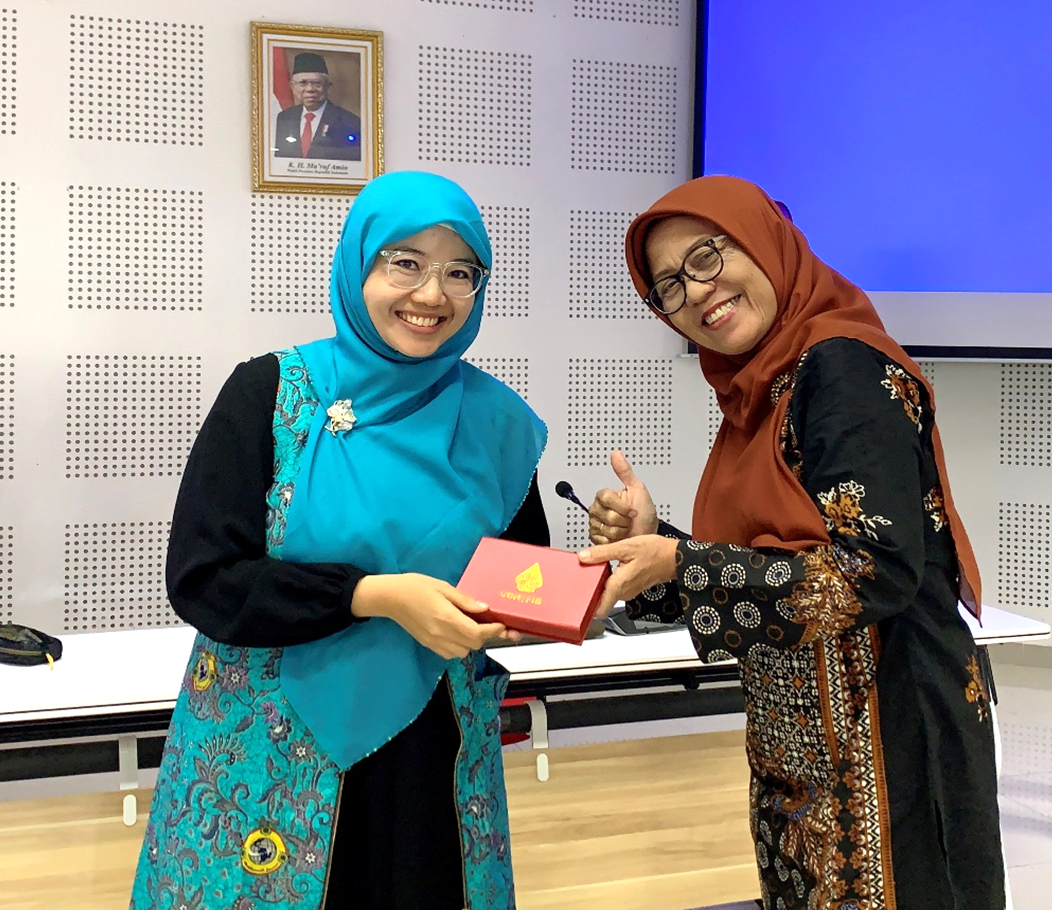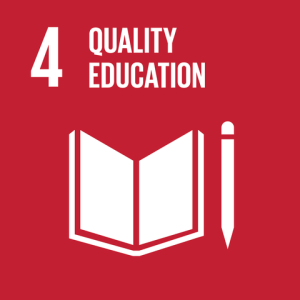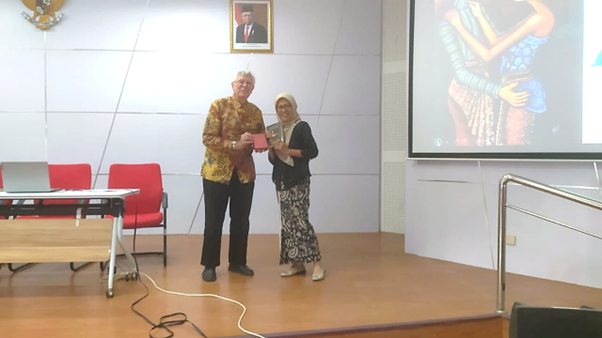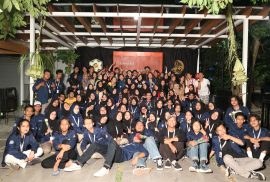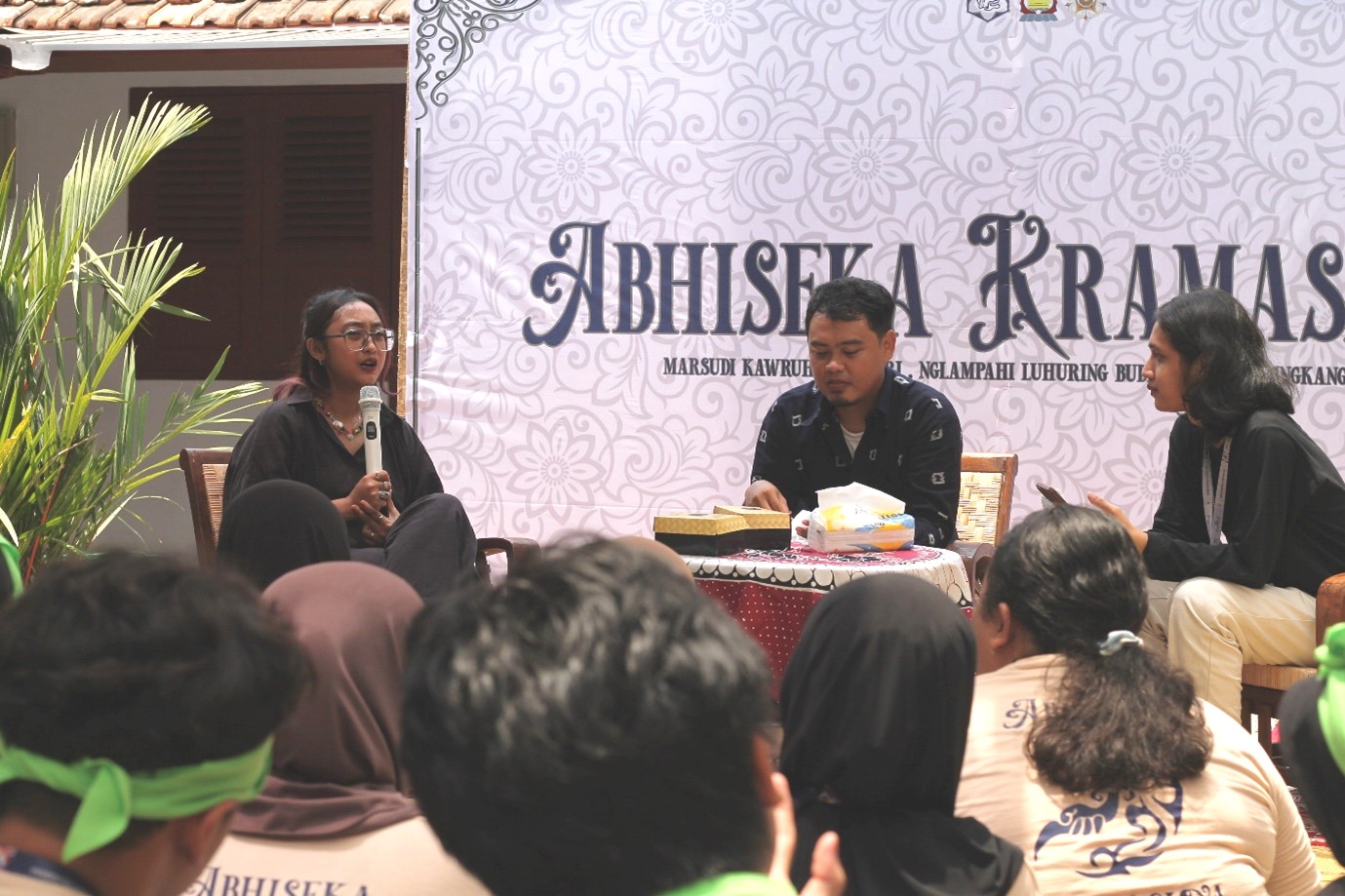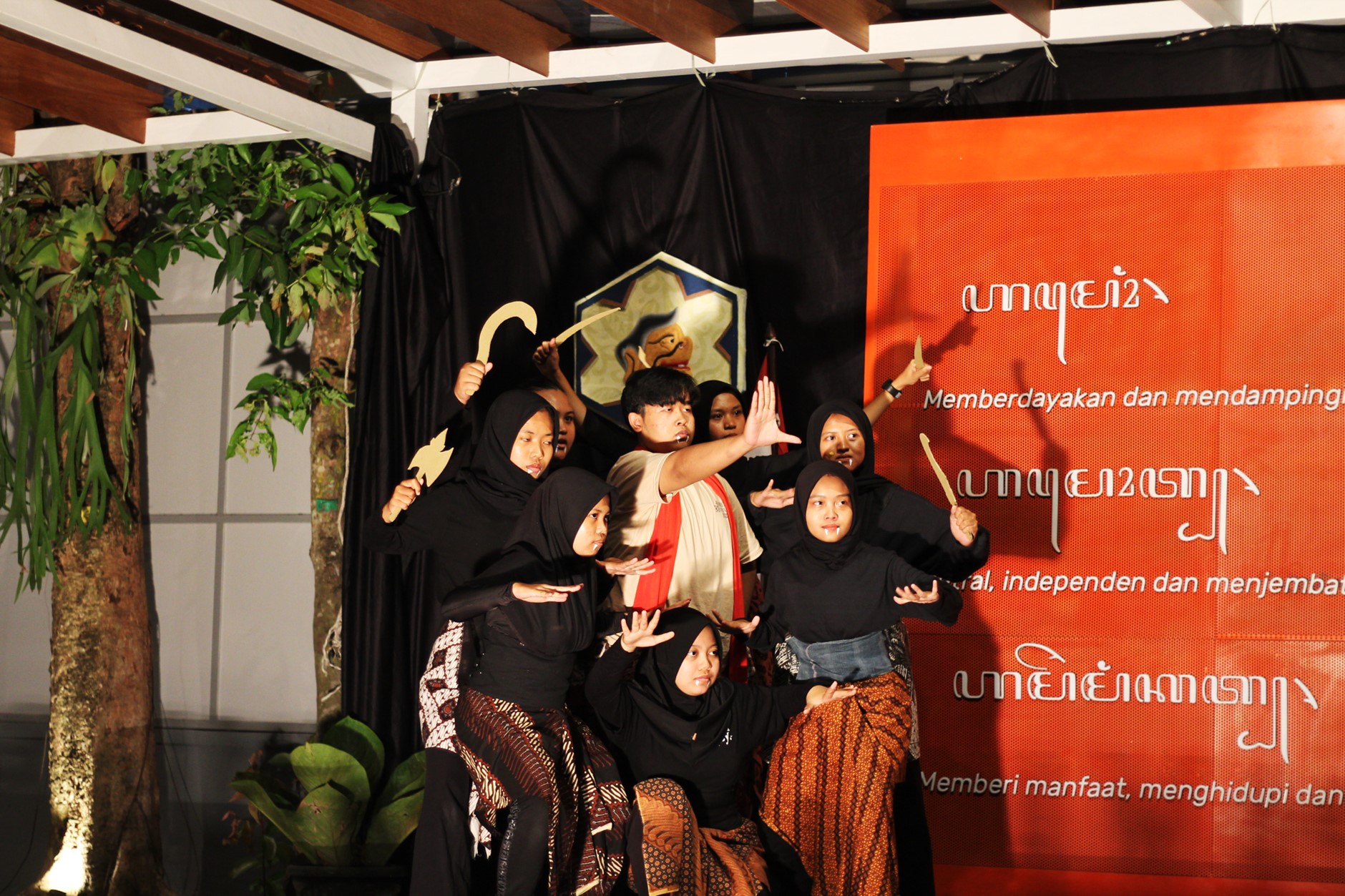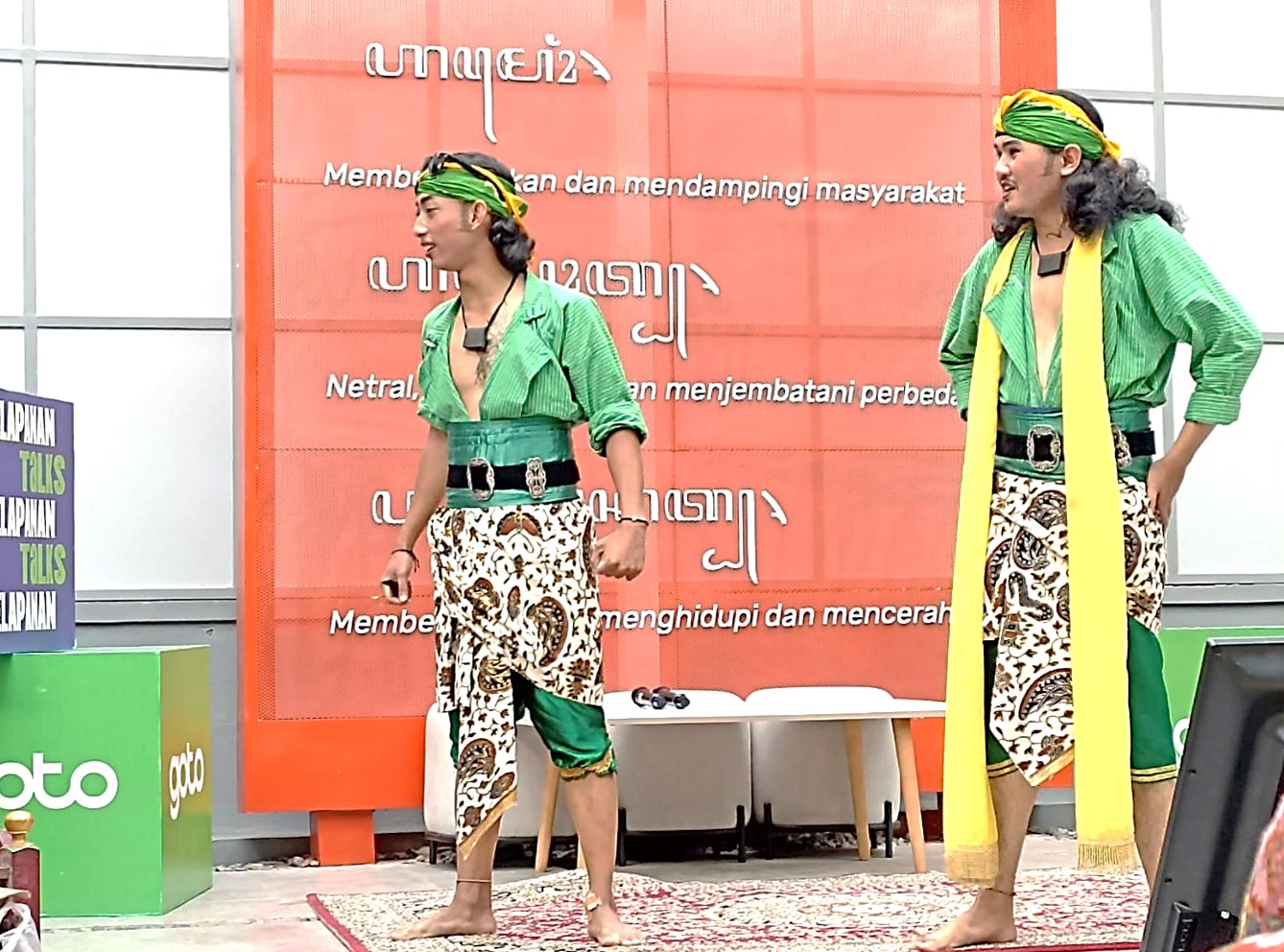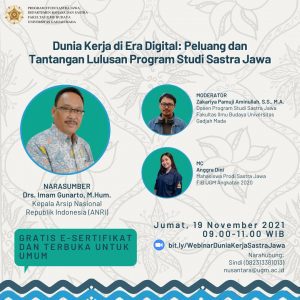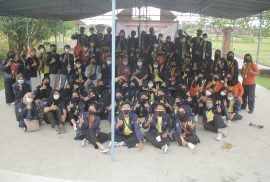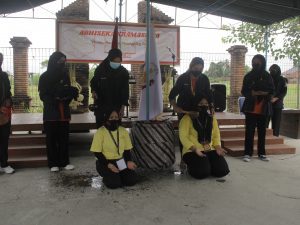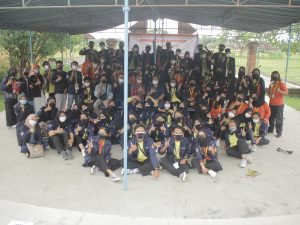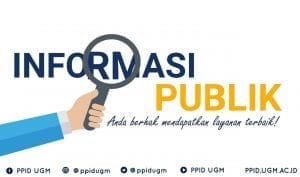October
Dr. George Quinn, Senior Lecturer at Australian International University Canberra, delivered a public lecture entitled “Brother-Sister Love in Modern Javanese Literature: Cangkriman for Literary Researchers”
College StudentNewsSDGS Tuesday, 17 October 2023
Yogyakarta (17/10/2023) - A public lecture entitled "brother-sister love in modern Javanese literature: cangkriman for literary researchers" has been organized by the Javanese Language, Literature and Culture Study Program, Faculty of Cultural Sciences, Universitas Gadjah Mada (UGM). The public lecture was held on Monday (16/10/2023) at the Auditorium, Soegondo Building 7th floor, Faculty of Cultural Sciences, UGM, and was attended by students of the Javanese Language, Literature, and Culture Study Program, and other participants interested in the topic.
The public lecture presented Dr. George Quinn, senior lecturer of Australian International University Canberra, as the speaker, Rudy Wiratama, S.I.P, M.A., lecturer of Javanese Language, Literature and Culture Study Program UGM, as the moderator, and Nurma Aisyah, student of Batch 2022, as the announcer.
On this occasion, Dr. George Quinn explained about an incest situation in novels of Modern Javanese Literature from 1939 to 2021. An interesting thing presented by Dr. George Quinn is that the love of these siblings is like the love of husband and wife.
"When the position of the character and his partner as brother and sister is known, it is as if they are okay and their relationship as lovers must be reformulated into a brother-sister relationship. Thus, because brother-sister sexual love clashes with the prohibition of incest, a husband and wife who model the "perfection" of brother-sister love, which contains psychological and religious tensions, will not be possible," explained Dr. George Quinn.
Dr. George Quinn (on the right) delivering his presentation.
he seemingly taboo topic of discussion actually aroused great curiosity in the participants. This was evidenced by the various questions asked to Dr. George Quinn in the discussion session, so that this public lecture successfully became a forum for discussing the proposed topic.
After the discussion session, Dr. Daru Winarti, M.Hum, as the Head of the Javanese Language, Literature and Culture Study Program, handed over a book as a souvenir. Dr. George Quinn also gave a souvenir in the form of a book to Dr. Daru Winarti, M.Hum. Afterwards, a documentation session was held to capture the moment of togetherness.
Gift giving by Dr. George Quinn (left) and Dr. Daru Winarti, M.Hum (right)
Rudy Wiratama, S.I.P., M.A., expressed his hope that the public lecture in the afternoon would inspire participants who wanted to research the topic in the future. "We hope that this public lecture will be a prank for all of you, so that it can inspire and bridge research related to Javanese Literature in the future".
ABHISEKA KRAMASISYA 2023: MARSUDI, NGLAMPAHI, MURAKABI
NewsCollege StudentStudent Monday, 16 October 2023
Abhiseka Kramasisya is a tradition held annually to inaugurate new students of the Javanese Literature Study Program. On Saturday, October 14, 2023, Abhiseka Kramasisya was attended by 47 new students of the Javanese Language, Literature and Culture Study Program. The theme carried out in the 2023 Kramasisya Abhiseka activity was "Marsudi, Nglampahi, Murakabi". The theme was inspired by a Javanese saying that has a positive meaning in it.
"Marsudi" means uniting towards a harmony and harmony. In this case, new students are expected to put aside all differences and be determined to unite into a family of Javanese Language, Literature and Culture students who are aligned in their goals, namely, seeking and collecting knowledge. "Nglampahi" means living knowledge for yourself. By joining students to become part of the Javanese Language, Literature and Culture Study Program at Gadjah Mada University, it is hoped that they can provide goodness for themselves. "Murakabi" means that the knowledge owned by oneself is useful for others so that it is part of the activities to maintain and preserve the noble values of Javanese culture and be able to continue efforts to maintain the existence of Javanese culture.
Before the series of activities of Abhiseka Kramasisya 2023 was carried out, a technical meeting was held by the committee to introduce participants, namely students of class 2023, about Abhiseka Kramasisya. In addition, the 47 participants have been divided into four teams, namely Saptaarga, Indrakila, Talkanda, and Kendhalisada. The names of the four teams are taken from the names of the pandhita's hermitages in the puppet characters.
The series of activities of Abhiseka Kramasisya 2023 began with registration, "Sesareng" or outbound, "Sartaka" or alumni talk show, "Semedi" or study program seminar, inauguration, "Kala Nrtya" or art performance, "Abhimata" or awards, and closing. The registration was held from 06.30 AM-07.20 AM WIB. After that, it was followed by "Sesareng" or outbound which was held at Greenland FIB UGM. The "Sesareng" activity was full of fun because it was filled with several games such as sarong volleyball, water relay, and so on. The Sesareng series lasted until 09.00 AM WIB.
The next activity was the opening of the series of Abhiseka Kramasisya 2023 activities which took place at the Center for Javanese Studies, Gadjah Mada University (PUSAKA JAWA UGM). After that, it was continued with "Sartaka" or a talk show with alumni of the Javanese Language, Literature and Culture Study Program. The event was held at 10.10 AM WIB-11.45 AM WIB. There were two alumni who shared their experiences, lecture tips, and an overview after graduating from the world of lectures, namely Vanis, S.S., and Mahmud Hidayat, S.S.
"Sartaka" Session
The next series of events was "Semedi" or study program seminars. The "Semedi" session took place at 13.00 WIB-14.50 WIB. In the seminar, the participants got a deeper understanding of the three specialization fields in the Javanese Language, Literature, and Culture Study Program, namely philology, linguistics, and literature. The three fields of specialization were explained by the lecturers from each of the specialization fields. The lecturers who attended the event included Dr. Daru Winarti, M.Hum., Dr. Djarot Heru Santoso, M.Hum., Dr. Sri Ratna Saktimulya, M.Hum., Dr. Arsanti Wulandari, M.Hum., R. Bima Slamet Raharja, S.S., M.Hum., Nurmalia Habibah, S.S., M.A., and Imam Prakoso, S.S., M.A. Various questions were expressed by the participants to the lecturers, illustrating their deep curiosity about each of the three specializations.
"Semedi" Session
After that was the main event of the Kramasisya Abhiseka, namely the inauguration. The inaugural session took place from 03.20 PM WIB to 05.00 WIB and was carried out the "Siraman"procession. Participants get their turn to undergo the procession. With the implementation of the procession, participants have officially become part of the Javanese Language, Literature and Culture Study Program Family. In addition, the participants also received the Javanese Literature Student Association (HMJ KAMASTAWA).
"Siraman" Prossesion
The next session was "Kala Nrtya" or art performance which was held at 06.20 PM WIB-07.30 PM WIB. In this session, the participants who had become four teams had to present a performance, either drama, music, dance, etc. The atmosphere at the art performance was very lively and warm, and the performances of the four teams were very mesmerizing. After "Kala Nrtya", the next session was "Abhimata" or awarding. The Abhimata session contained several nominations, including the most exciting group, the most compact group, and other nominations. The last session was the closing session which ended with a group photo, with the intention of capturing the moment of togetherness.
"Kala Nrtya" Session
With the implementation of the 2023 Kramasisya Abhiseka series, it is hoped that new students of the Javanese Language, Literature and Culture Study Program can love the country more and participate in the preservation of the archipelago's culture, especially Javanese culture. Students who have been inaugurated are expected to be able to channel their concern for the culture of the archipelago through educational activities, research, and community service so as to create superior student characters, achieve, dignify, and participate in improving the quality of education in Indonesia.
Selapanan Talk #2 PUSAKA JAWA was enlivened with Banyumasan Art Performance by PASEBAN and Students of Javanese Language, Literature, and Culture Study Program
College StudentNewsSDGS Monday, 16 October 2023
Yogyakarta (16/10/2023) - The Selapanan Talk #2 event held on Friday (13/10/2023) by PUSAKA JAWA UGM was warm and lively. Not only because of the interesting topics and extraordinary speakers, but also because of the interesting and enchanting art treats. The art that captivated the participants was none other than Banyumasan art.
Kethoprak performance
The Banyumasan art was performed by PASEBAN (Paguyuban Seni Banyumasan) in which students of the Javanese Language, Literature and Culture Study Program took part. They are Yanuar Agung Nugroho (2023) as a Calung player, and Taruna Dharma Jati (2019) as a dancer and performer. The arts performed included Banyumasan gendings, such as ricik-ricik Banyumasan, and eling-eling Banyumasan, kethoprak, and lengger dance.
Lenggeran performance
The Selapanan Talk event is a routine activity held every 35 days. The theme of Selapanan Talk #2 was "Dialogue of Taste, Transformation of Time" presented by two main speakers, Tania Kristi, S.S., culinary practitioner, Master Student of Faculty of Arts UGM, and researcher at the Center for Cultural Studies UGM, and Saiful Bachtiar, Head of Public Policy & Government Relations Central & West Java GOTO. The event presented a discussion on how the journey of food can be obtained by humans, from the discovery of fire, the presence of various kinds of processing, to the convenience presented through online applications.
Webinar “Digital Era Job Market: Opportunities and Challenges for Javanese Literature Graduates”
News Wednesday, 4 October 2023
On Friday, November 19, 2021, at 09:00 AM WIB, the Javanese Literature program at Universitas Gadjah Mada organized a webinar aimed at Javanese Literature students, particularly alumnus. The webinar was titled "Digital Era Job Market: Opportunities and Challenges for Javanese Literature Graduates" and featured an experienced speaker, Drs. Imam Gunarto M.Hum, is an alumnus of Sastra Nusantara (now known as Javanese Literature) at Universitas Gadjah Mada and currently serves as the Head of the National Archives of the Republic of Indonesia (ANRI).
During the webinar, Mr. Imam explained that in the current era, Javanese Literature graduates can pursue various career paths. They are not limited to being teachers or researchers; as Mr. Imam himself has proven, Javanese Literature graduates can also become leaders. He emphasized that Javanese Literature graduates should possess a unique perspective compared to others and confidence in their skills is also crucial to support their expertise.
Another crucial aspect to consider is preparing for the 5.0 society era. Careful planning from the beginning is essential to face any future challenges that may arise. Therefore, to achieve the desired career goals, mastery of interdisciplinary knowledge is also vital.
The ongoing pandemic has significantly affected job opportunities for the public. The consequences of the pandemic are evident, with many people losing their jobs due to the prevailing difficult circumstances. As a result, having skills is indispensable to thrive in an increasingly competitive job market.
In the "Digital Era Job Market" webinar, Mr. Imam also highlighted various challenges that need to be addressed at present. These challenges include the work ecosystem, deregulation, debureaucratization, new work formats, global talent, competition gap between university graduates and the job market, individual capacity, and active learning in training systems.
Therefore, through this webinar, Mr. Imam conveyed a message to the younger generation, especially Javanese Literature graduates, to pay attention to their performance and capacity, adopt a positive view of the world, and continuously strive to improve their skills (determining what they do) to support their career growth in the future.
Abhiseka Kramasisya 2021
College StudentNews Tuesday, 3 October 2023
Abhiseka Kramasisya is an inauguration event for new students of the Javanese Literature Study Program. In 2021, the event was held in October and was attended by 35 new students of the Javanese Literature Study Program. This year's Abhiseka Kramasisya event carries an interesting theme, namely "Manata, Marsudiya, Manunggaling Asta".
The meaning of the theme above is "Manata" which means organizing or making preparations, both setting goals or preparing oneself (mentally and physically), as well as preparing plans.
"Marsudiya" is a mandate that we try our best to achieve the desired goals. Don't give up and give up easily even though you are going through obstacles in the process that you are going through.
Meanwhile, "Manunggaling Asta" means joining hands which has the meaning of praying. Through prayer we can surrender everything we have done and fully surrender to God for the final results we receive. "Manunggaling Asta" can also mean joining hands. A figure of speech which means to strengthen the family, either with younger or older people. In addition, we can also refer to the word “manunggal” which means one, and the word “asta” which means two as sengkalan for the year 21 or 2021.
The Abhiseka Kramasisya program was divided into three series of events, namely the "Nglaras Memitran and Study Program Seminar" which was held on October 23, 2021, followed by the "Nglaras Karsa" event which was held on October 24, 2021, and ended with the main event, namely "Inauguration of New Students" on October 30, 2021.
The implementation of the first series of activities began with the opening of the event by the presenter followed by the inauguration of the opening of the activities by the Head of the Javanese Literature Study Program, Dr. Daru Winarti, M.Hum. Then, continued with "Nglaras Karsa" which is an introductory activity, both from new students and the lecturers and event committee. After that, it was closed with the last event "Seminar Study Program", namely the presentation of three specializations in Javanese Literature by Dr. Hendrokumoro, M. Hum. (majoring in linguistics), Dr. Sri Ratna Saktimulya, M.Hum. (majoring in philology), and Dr. Wisma Nugraha Christianto R., M.Hum. (literary major). The series of activities on the first day were carried out online via Zoom Meeting.
The implementation of the second day's activities began with the opening of the activity by the presenter. After that, it was followed by the "Nglaras Karsa" activity, which was a talk show with Javanese Literature alumni, namely Fajar Wijanarko, S.S. and Kezia Permata S.S. The two alumni gavesharing experience as welltips The world of lectures is very interesting to follow. The second day of the event was also held online via zoom meeting.
Meanwhile, the series of events on the third day were carried out offline and in collaboration with the Tembi Rumah Budaya Museum. The implementation of the event on the third day began with an opening ceremony led by the chief executive, namely Amabilita C. S. Then, it was continued with a museum tour guided by Tembi Rumah Budaya Museum officers. The event continued with activitiesmini games as well as the main event, namely the inauguration of new students. After that, it was continued with an art appreciation performance by Javanese Literature Class 2021 friends, giving impressions of messages and closing with a group photo session.
The entire series of Abhiseka Kramasisya events for three days is expected to provide learning and a good impression on Javanese Literature class 2021 friends. With the confirmation of Javanese Literature class 2021 friends as part of the Javanese Literature Student Family (KAMASTAWA), one day they will be able to dynamically and process together to become quality students.
Sanskrit Public Lecture
News Tuesday, 3 October 2023
In September 2021, the Javanese Literature study program will hold a public lecture on Sanskrit entitled "Short Course of Basic Sanskerta”. The lectures were held twice in September, namely on the 11th and 18th. The keynote speaker at the Sanskrit public lecture was Prof. Viroopaksha V. Jaddipal. He is a professor from India. The participants of the public lecture were the general public, especially students of the Javanese Literature study program.
Of the many materials related to Sanskrit, the material discussed at the meeting was the basic material of Sanskrit, two of which were the correct way of pronouncing Sanskrit words and knowledge of how to use the right words in composing a sentence. The public lecture was attended by a large number of participants. Although most of the participants were students from educational backgrounds in Javanese literature, there were also several participants from outside the field of Javanese literature.
Through these public lectures, many things can be learned. Not only about how to learn Sanskrit properly and correctly, but it also serves as a reminder for us that learning other languages is also necessary to support success in learning activities. As stated by one of the 2020 Javanese Literature study program students, Muhammad Ikhsan, he is happy to be able to learn Sanskrit with experts directly. Sanskrit, which was initially difficult, became understandable enough through this public lecture.
Multi-language ability is indeed not the main thing for the general public, but for the academic community, especially students who want to explore deeper knowledge, multi-language ability is very necessary. Through this ability, it will make it easier for students to study sources of knowledge in other languages, so that they will have an increasingly broad knowledge. In this case, multi-language is also useful as career support. The ability to multi-language is a separate consideration for companies providing work, especially in an increasingly modern era like today.

